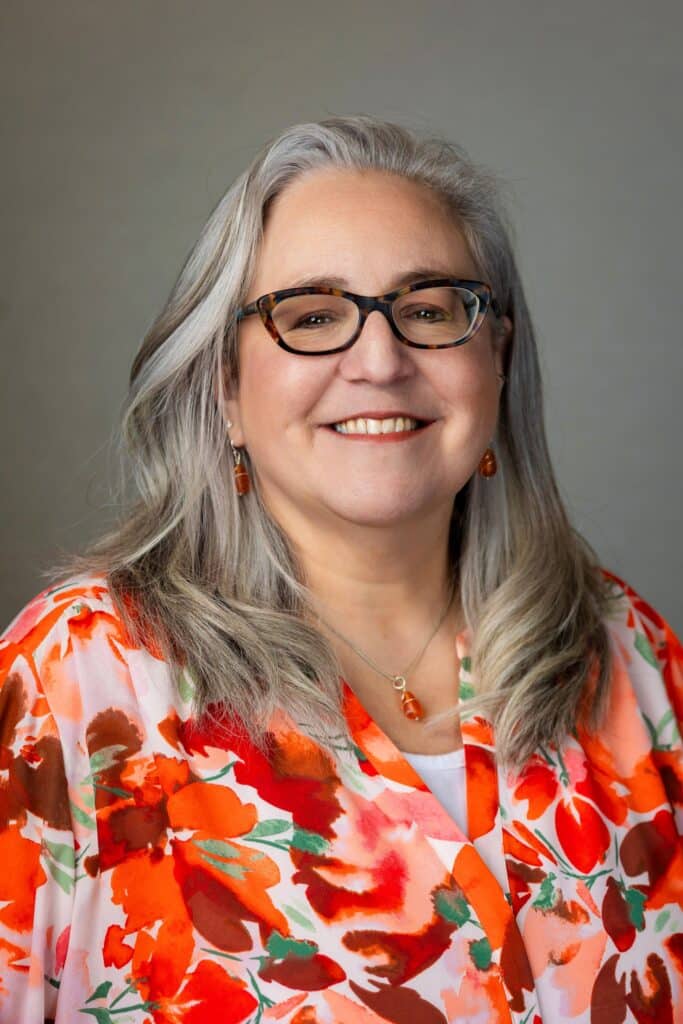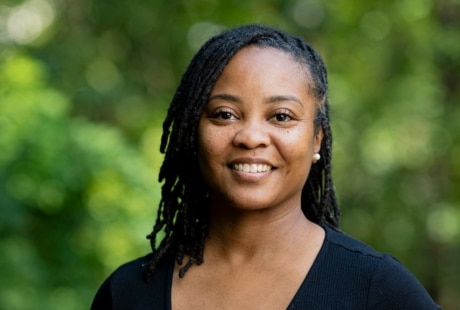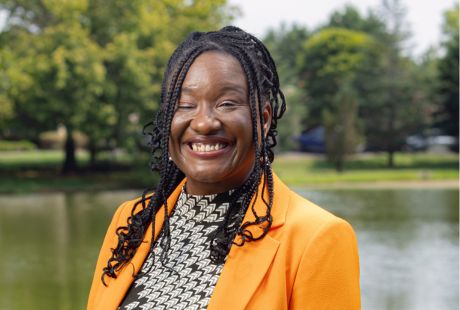What does Black History Month mean to you?
Reflections from some of the College of Social Work’s faculty.

Mary Gitau:
While Black History Month provides an opportunity to celebrate the victories and progress in the ongoing fight for racial justice, it also serves as a reminder that there is still much work to be done. As a faculty member of color and a social worker, I remain deeply committed to advocating for social justice, engaging in anti-oppressive initiatives, and continually fighting against racial inequalities. This month, like every month, fuels my dedication to creating lasting change and fostering equity in all aspects.

Kate Chaffin:
For me, Black History Month is a time to celebrate Black scholars, educators, and social workers shaping our field today. I am committed to fostering spaces where my Black colleagues and student voices are centered ensuring their ideas and contributions thrive and shine throughout the year. This is a time to recognize the creative, intellectual, and leadership contributions already present and to amplify that even further by acknowledging that we are greater and stronger because of our Black colleagues and students. Further, this is a time to dive even deeper into the understanding of intersectionality, and honoring the complexity and value of lived experiences as a strength—where race, gender, class, and other identities intersect to produce unique perspectives that unequivocally enrich our academic community and make it better for everyone. In order to do this, we are all responsible for interrogating policy, procedure, and our own thinking etc. to ensure that we are creating spaces for thriving and shining!

Stan Bowie
A Sumerian legend tells of a traveler who asked an elderly man, “Whatever happened to the people of Sumer, who were Black?” “Ah,” the old man sighed. “They lost their history, so they died.”
I was posed the following question by a friend and colleague at the College of Social Work: “What does Black history mean to you?” The short answer: Everything. The long answer: EVERYTHING.
As I reflect on my decades of living in America, Black/African history has played—and continues to play—a significant role in who I was as a young child, and the man I invariably evolved into today. When I was a child growing up in the Northside neighborhood of Pittsburgh, Pennsylvania, we were a poor family whose parents had migrated from Arkansas in the 1940s to seek opportunity and escape racial violence. We were poor as church mice, and my parents worked very hard at thankless jobs, but we never once went to bed hungry. I have immense respect for them and on their ability to finally get a piece of the rock.
All of that introduction was to provide my personal context and worldview before the burgeoning Black Consciousness movement in the 1960s and 1970s. I remember the neighborhood (‘hood) vividly and I remember how myself and many others just blended in like camo in the woods. As a kid, the prevalent thinking as you surveyed your environment was that it was simply our norm to live in the hood and we just took its many ills (i.e., high violent crime and homicide rates, high rates of unemployment, violence, inferior housing, etc.) for granted. That’s just the way it is, right? And of course, the Black man is always on the bottom, getting the crappy jobs with the lowest pay, right?
My thinking as I traversed adolescence and continued my observations was, why is this happening to us? My formative years were lived during the Black consciousness/Black pride/Black power eras. This is when my eyes began to open about historical truths and the centuries-old origins of the global slave trade, colonialism, violent and forced racial oppression for a European country or America’s economic gain. In other words, I was achieving clarity on how we got here today.
The main victim of these repeated violations was sweet mother Africa, the Cradle of Civilization itself. Black/African history study also unveiled another clear geo-historical pattern, i.e., White European countries and America were systematically oppressing Blacks/Africans on a global scale and to the point where the practice of slavery became integrated into and integral to their very economies. This tragedy was further compounded by internecine warfare and slave-capturing among and between African countries.
Black/African history has made me understand the totality of humankind and its oppressive nature from the beginnings of civilization to the present day. It has made me know about African kings and queens, warriors, kingdoms, engineers and mathematicians, physicians, etc., who thrived in societies as far back as 2000 B.C. Black history points out the fierce and indomitable spirit of leaders, heroes, and sheroes from the aforementioned early times through more recent centuries, like Shaka Zulu, Hannibal of Carthage, Harriet Tubman, Frederick Douglass, Dr. W.E.B. DuBois, Dr. Martin Luther King, Jr., Malcolm X, Rosa Parks, John Lewis, Mary McCleod Bethune, and Andrew Young, just to name a few. Black/African history connects all historic epochs into a tapestry of time, weaving the totality of the African Diaspora and its great contributions to science, the arts, athletics, world culture, politics, etc. Black/African history helped fulfill my destiny as a man and a scholar by opening my eyes to the truth about Black/African greatness, my personal connection to that greatness, and how it remains alive through my own heightened consciousness about who my people were, who I am, and to my commitment to standing on their shoulders to improve the human condition, especially in Black/African communities.

Andrea Joseph-McCatty:
The fight to live,
The fight to be,
the fight to be free.
One of victory,
one of defeat,
one of resilience and mutual aid –
that is what Black History Month represents to me.
A time of remembrance,
A time to honor,
and some vicarious anger, too.
Yet, because of their sacrifices, I had a pathway through.
Black History Month is an opportunity to marvel at sheer ingenuity.
From revolts and marches to the invention of cataract removal technology.
Indeed, Black history is the true insignia for – be all that you can be!
Black History Month reminds me of the joy and solace found in Black creativity,
in the soulful melodies of jazz, gospel, and R&B,
to echoes of freedom songs once sung in Tennessee.
Let’s not forget the swagger and grace of Black dance, fashion, and hairstyles—
a legacy of artistry, I bet you can agree.
Simply, the beauty of Black History Month is Black audacity!
The audacity to live,
To love,
To create,
And to laugh in the face of oppression for the whole world to see.

Lori Messinger:
As a child, I grew up celebrating Black History month through class projects, movies, speakers, and musical performances. To me, Black History Month was part of the fabric of my community and my own history. I learned that we all participated, because Black History matters to all of us. The history I learned was the history of my country, the American story. Black History Month also offered a perspective that was missing in other histories that I learned about in my textbooks and classrooms.
In addition to hearing stories of the accomplishments of individual Black leaders, poets, scholars, athletes, and scientists, we learned about the legacy of cycles of individual and institutional racism, bias, and discrimination and how they were confronted with times of protest, education, emancipation, and celebration. Even now, the repetitive nature of this cycle, and the tenacious persistence of racism, is necessary to acknowledge and just as upsetting. As a white person, I see myself reflected on all sides of this history. The stories of growth and change shared as part of Black History Month provide encouragement that progress is possible, and that I can have a role in working for that progress.
I sang “Lift Every Voice and Sing,” also known as the Black National Anthem, in every choir from elementary through high school. We sang it often, not just during February, but that song really encapsulates the spirit of Black History Month for me. The song starts with a shared commitment to liberty but reminds us that we cannot get there without walking through the stony road of Black History in the United States, watered with tears and blood. We must keep faith and hope, derived from this difficult history, and remember that fighting racism, discrimination, and hatred is something we have to do together—as social workers, as Americans, as people in this world. “Let us march on ‘til victory is won.”

Latausha Stevenson:
Black history is American history, offering an opportunity to share the stories of liberation, resilience, and contributions made by Black pioneers throughout time, pioneers such as Malcolm X, Fred Hampton, Harriet Tubman, and Sojourner Truth.
Black History Month originally began as a week-long commemorative event that officially extended into a month-long observance almost 50 years ago. My hope is that this celebration extends beyond the constraints of one month out of the year and is celebrated and/or acknowledged by all Americans, every month of the year.
It is also my hope that we teach a history that is truthful, a history that is transparent, and a history that goes beyond what is comfortable for our neighbors. Black history did not begin with the Middle Passage, nor did it begin with slavery (yes, it encompasses those events, but it is far from the beginning). Black history is deep, Black history is extensive, and Black history is rich. There is absolutely, unequivocally no American history without Black history.

Javonda Williams:
Black History Month brings back cherished memories of church speeches, vibrant African-inspired attire, and the celebration of Black culture. It is a moment to reflect on the rich history and culture that have influenced the lives of all Americans. I feel a sense of excitement about the celebrations of hope and empowerment that this month brings. It serves as a reminder of the strength, dignity, and courage demonstrated throughout history. Barack Obama beautifully expressed this when he said, “Black History Month is about the shared experience of all Black Americans whose lives have shaped, challenged, and ultimately strengthened America.” This month is an opportunity to honor the past, celebrate the present, and look forward to a promising future. Black History Month stands as a powerful testament to the enduring spirit and boldness of Black Americans.
